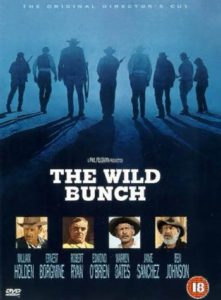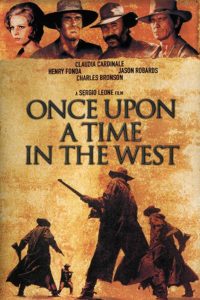Wednesday Double Feature – Epic Deconstructions of the Western
This week I decided to watch some of the great western epics that both deconstruct the genre of the Western and in the process essentially do a biopsy of the end of an era.

The first on my list, Sam Peckinpah’s The Wild Bunch tells the story of the eponymous band of ruthless bandits led by Pike Bishop, (William Holden) who commit what they believe is going to be their last place. This turns out to be a trap by some tragically incompetent bounty hunters led by Pike’s old partner, Deke Thornton (Robert Ryan). This ends up with the Wild Bunch shooting their way out of town with half of them dead with numerous townsfolk killed in the crossfire. Now they have to run for their lives and to make matters worse the silver shipment they thought they’d successfully stole was just useless bags of dowels that just baited the trap. Desperately they cross the border finding themselves in the middle of the Mexican Revolution and working for one of the generals.
I first heard of Sam Peckinpah in a Monty Python skit where they ruthlessly parody the violence of his films with a blood-soaked version of “Salad Days”. I’ve been curious about his films, or at least his notoriety ever since. Despite all this, I’ve never actually gotten around to watching any of his films. I found Wild Bunch to be very well done and to be honest by our modern standards, the violence wasn’t half as bad as I thought. (Though to my knowledge, I think this is the earliest film I saw anyone using squibs in the actor’s back to show just how much damage that bullets use. Having said that I found the films bleak outlook where any allusions of high plains chivalry are dismissed as the myths they are, and there are only shades of grey. The only reason we can root for our band of murderous thugs is they are nothing compared to the sadistic, uncaring, army they are up against.

The next film on my list, Sergio Leone’s Once Upon a Time in The West, begins with some hired guns wait at a dilapidated train station waiting to kill the man who gets off the train. This man turns out to be a mysterious harmonica-playing gunfighter (Charles Bronson) who manages to kill all of them.
Meanwhile, a family of homesteaders is preparing a wedding celebration for the father’s mail-order bride. They are slaughtered by a murderous gunfighter named Frank (played by a deliberately miscast Henry Fonda). Frank is working for the railway. They just wanted to scare the family to give up their land, but as Frank says, “’people scare better when they’re dying.”
A day later the bride, Jill McBride (Claudia Cardinale) arrives just in the time for the funeral and has no choice to take up where her husband left off. Can she survive with the odds so seriously against her? And will the mysterious harmonica player be any help at all?
While I don’t think I’ll ever like this quite as much as the “Dollars” trilogy, this film is Leone at his best. Using every trick in his toolbox from extreme closeups tight pacing, and Morricone’s haunting leitmotifs, he creates a haunting, mythic operatic setting, that with the coming of the railroad, will soon be gone.







You must be logged in to post a comment.